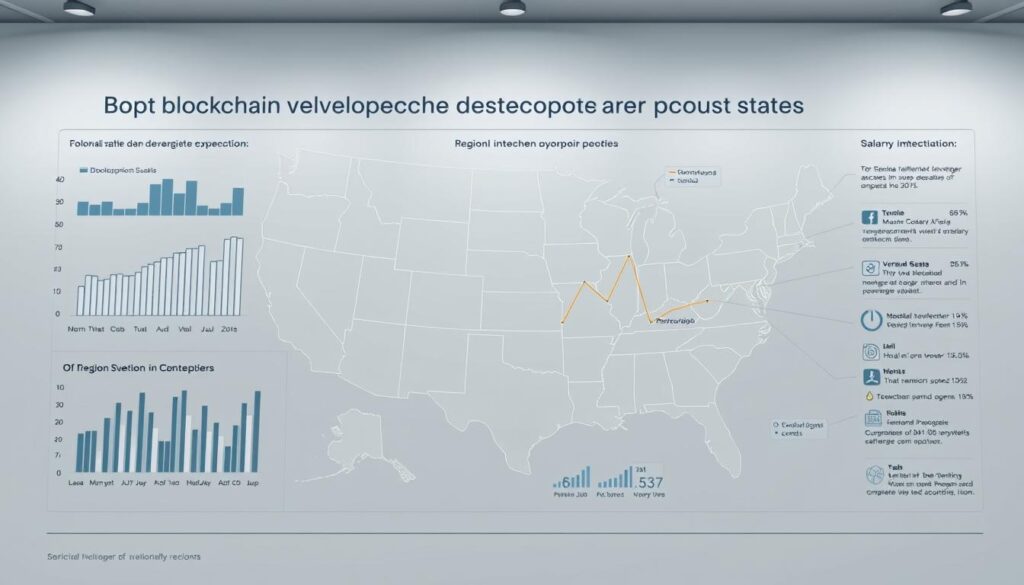The digital landscape is constantly evolving. New technologies create exciting opportunities for skilled professionals. One field experiencing remarkable growth is based on decentralized and encrypted databases.
This innovation has sparked a high need for experts who can build and maintain these systems. These tech professionals are in great demand across the globe. Their work is crucial for the future of many industries.
Compensation for these roles is very competitive. Recent data from job boards shows annual pay can range significantly. Factors like location and experience play a major role in determining final pay.
Statista forecasts the global market for this technology could exceed $943 billion by 2032. This growth ensures a strong future need for qualified talent. This guide will explore the details of pay scales in different regions.
Key Takeaways
- High Demand Field: The need for specialized tech talent in this area is growing rapidly worldwide.
- Competitive Pay: Professionals in this field command attractive compensation packages.
- Role Specialization: There are key differences between core system architects and application builders.
- Market Growth: The industry’s expansion is a primary driver for continued career opportunities.
- Multiple Influences: Final compensation is shaped by location, experience, and technical skills.
- Global Perspective: Pay scales vary significantly from one country to another.
Global Trends in Blockchain Developer Salaries
A powerful surge in market valuation is reshaping compensation structures for professionals building next-generation digital infrastructure. This growth is not limited to digital currencies but extends across enterprise solutions and decentralized applications.
Overview of Blockchain Market Growth
Concrete data highlights the sector’s explosive expansion. The global market for this technology is projected to exceed $943 billion by 2032. Furthermore, the cryptocurrency market capitalization reached a staggering $3 trillion in late 2024.
This expansion multiplies the need for specialized talent. Fields like decentralized finance (DeFi) and Web3 require deep technical expertise. Companies are competing fiercely to secure qualified professionals.
Impact of Disruptive Technologies on Salaries
The transformative nature of this technology creates a scarcity of experts. This scarcity drives compensation well above traditional software roles. The U.S. Bureau of Labor Statistics supports this trend.
They project a 17% growth for software developers from 2023 to 2033. This category includes experts in distributed systems. Approximately 140,100 new jobs are expected each year, indicating strong job outlook.
The table below summarizes key drivers behind rising compensation packages:
| Factor | Description | Impact on Pay |
|---|---|---|
| Market Size | Projected value of nearly $1 trillion by 2032 | High |
| Adoption Rate | Increasing use in finance, supply chain, and tech | High |
| Talent Supply | Limited pool of professionals with niche skills | Very High |
| Job Growth | BLS projection of 17% growth in the field | High |
This macroeconomic context explains why compensation commands premium rates. The following sections will explore regional and experience-based variations in detail.
blockchain developer salary expectations worldwide
The United States market demonstrates clear patterns in how location influences remuneration for experts in cryptographic ledger systems. Compensation figures vary significantly between metropolitan areas, reflecting local demand and economic conditions.

Regional Salary Breakdown in the United States
Geographic location plays a crucial role in determining compensation levels. Major tech hubs offer premium packages to attract specialized talent.
| City | Annual Compensation | Notable Feature |
|---|---|---|
| Brooklyn, NY | $194,630 | Highest paying market |
| Dallas, TX | $191,363 | Strong emerging hub |
| Sunnyvale, CA | $181,775 | Silicon Valley premium |
| Boston, MA | $178,851 | Academic and tech center |
| Los Angeles, CA | $171,425 | Entertainment tech focus |
Experience-Based Salary Variations
Career progression shows substantial financial growth for professionals in this field. Entry-level positions now start around $121,000 annually.
Mid-career specialists with 3-5 years typically earn between $140,000 and $165,000. Senior experts command packages reaching $187,000 per year. This reflects the premium placed on advanced technical skills.
Factors Influencing Salary Ranges
The final compensation figure reflects a complex interplay of regional economics and individual qualifications. Multiple variables combine to determine earning potential for professionals in this field.

Location and Cost of Living Considerations
Geographic placement significantly impacts remuneration levels. Major technology centers offer premium packages that account for higher living expenses.
Local talent competition and industry concentration also affect payment structures. Areas with numerous distributed ledger companies typically provide better compensation.
| Location Factor | Impact Level | Example Effect |
|---|---|---|
| Cost of Living | High | 20-30% premium in expensive cities |
| Local Industry Demand | Very High | Competitive bidding for scarce talent |
| Talent Pool Size | Medium | Lower competition in emerging markets |
| Company Density | High | Multiple employers drive up offers |
Job Title, Credentials, and Industry Demand
Specialized roles command different compensation levels. Technical expertise in specific platforms directly influences earning potential.
Credentials and educational background play crucial roles. Employers value certifications and demonstrated experience with complex projects.
Industry sector creates significant payment variations. Financial technology firms typically offer higher compensation than traditional enterprises.
Career Paths and Specializations in Blockchain Development
Professionals entering the field of distributed ledger technology can pursue several distinct career trajectories. Each specialization requires unique technical skills and offers different compensation levels.

The Bureau of Labor Statistics projects 17 percent growth across these roles from 2023 to 2033. This strong outlook reflects increasing demand for specialized expertise.
Smart Contract and DeFi Roles
Smart contract development represents one of the most sought-after specializations. These professionals create self-executing contracts that automate business processes.
According to market data, smart contract specialists earn average salaries of $160,000 annually. Glassdoor reports smart contract engineer positions average $88,893.
DeFi application development requires deep understanding of both finance and programming. These specialists build decentralized financial protocols with complex tokenomics.
Blockchain Software and Quality Engineering
Blockchain software developers design applications for decentralized platforms. They research infrastructure and implement new features.
These professionals earn approximately $106,367 annually according to Glassdoor data. Their work involves verifying functionality across distributed systems.
Quality engineers ensure project excellence by creating testing guidelines and automation. They typically earn $108,456 and need knowledge of software development lifecycles.
Essential Technical Skills and Programming Languages
Mastering specific programming competencies is essential for building robust decentralized applications. Technical expertise forms the foundation for creating secure and efficient distributed systems.
Mastery of Languages: Python, Solidity, Rust, and JavaScript
Python has emerged as a significant entry point for distributed ledger development. Algorand’s native Python support, launched in March 2024, opened doors for traditional programmers to transition into this space.
Successful professionals typically master multiple languages. Solidity remains crucial for Ethereum smart contract creation. Rust excels for high-performance applications, while JavaScript handles Web3 integration.
Blockchain-Specific Tools and Frameworks
Specialized tools form the daily working environment for technical professionals. These include development environments, testing frameworks, and Web3 libraries.
Algorand offers Python AlgoKit and TypeScript AlgoKit utilities. These provide intuitive functions that make building solutions easier and safer. The goal is streamlined application creation on the platform.
Beyond programming, experts need deep understanding of distributed ledger architecture. Knowledge of consensus mechanisms and cryptography proves essential. Security awareness remains critical for smart contract development.
Emerging Technologies and Their Impact
Technical evolution continues to transform how professionals build decentralized systems. New tools and platforms are making this technology more accessible than ever before.

These innovations significantly impact workflow efficiency and career opportunities. They reduce barriers for software experts entering this field.
Innovations like Algorand’s Python Integration
Algorand’s March 2024 Python support represents a major shift in programming accessibility. This integration allows millions of existing Python programmers to transition smoothly.
AlgoKit 2.0 provides comprehensive utilities in both Python and TypeScript. These tools make building solutions faster and safer through intuitive functions.
Advancements in Consensus Mechanisms and Security
Pure Proof-of-Stake consensus offers simpler architecture compared to complex models. This enables professionals to focus on application logic rather than protocol complexity.
Built-in security features reduce common development pitfalls. Atomic transfers prevent partial transaction execution, while simplified account models enhance safety.
| Feature | Algorand Advantage | Traditional Challenge |
|---|---|---|
| Finality | Instant transaction confirmation | Multi-block finality with potential reorganizations |
| Asset Creation | Layer-1 support without complex smart contracts | Requires extensive contract development |
| Performance | 10,000 transactions per second | Limited throughput affecting application scale |
| Development Tools | Comprehensive documentation with practical examples | Steeper learning curve for new entrants |
These technological advancements create new possibilities for project development. They enable more sophisticated applications with improved security and user experience.
Conclusion
Across global markets, the demand for specialized technical expertise in cryptographic systems shows no signs of slowing. The data reveals a field characterized by robust growth and competitive compensation for qualified professionals.
Compensation packages reflect multiple factors including geographic location, experience level, and specific technical specializations. Career progression offers substantial financial growth, with senior roles commanding premium remuneration.
For technical professionals considering this career path, the combination of strong market demand and diverse specialization opportunities creates an attractive proposition. The field presents compelling prospects for those willing to develop the necessary skills.
FAQ
What is the average blockchain developer salary in the United States?
In the United States, compensation for these tech specialists varies significantly. On average, annual earnings range from approximately 0,000 to over 0,000. This figure is heavily influenced by factors like geographic location, such as tech hubs like San Francisco or New York, and the individual’s specific expertise in areas like smart contracts.
How does experience level affect a developer’s pay in this field?
Experience is a major driver of income. Entry-level professionals might start with a competitive package, but those with several years of hands-on work on major platforms like Ethereum or Hyperledger can command much higher pay. Senior roles, especially those involving project leadership or deep security knowledge, see the most substantial salary increases.
Which programming languages are most valuable for a career in blockchain development?
Proficiency in certain programming languages is critical for high earnings. Solidity remains essential for creating smart contracts on Ethereum. Knowledge of Python, Rust, and JavaScript is also highly sought after by companies building decentralized applications. Mastery of these tools directly impacts market value.
Are salaries for these roles consistent around the world?
No, global pay scales are not uniform. While North America and Western Europe offer some of the highest compensation packages, emerging tech markets in Asia and Eastern Europe may have different salary ranges. These differences often reflect local industry demand, cost of living, and the maturity of the regional tech sector.
What specializations within blockchain lead to the highest pay?
Specialists focusing on cutting-edge areas tend to earn the most. Roles centered on Decentralized Finance (DeFi), advanced cryptographic security, and developing on new platforms like Algorand are in high demand. Expertise in consensus mechanisms and scalability solutions also positions professionals for top-tier jobs and salaries.


No comments yet